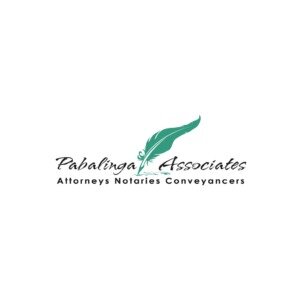Best Environmental Law & Compliance Lawyers in Botswana
Share your needs with us, get contacted by law firms.
Free. Takes 2 min.
Or refine your search by selecting a city:
List of the best lawyers in Botswana
About Environment Law in Botswana
The environment in Botswana is characterized by diverse ecosystems, including the Kalahari Desert, Okavango Delta, and vast savannahs. Environmental law in Botswana seeks to balance the sustainable use of natural resources with environmental conservation. Key legislation includes the Environmental Assessment Act, Wildlife Conservation and National Parks Act, and regulations on water, waste management, and atmospheric pollution. These laws support the protection of Botswana’s rich biodiversity, ensure sustainable land use, and regulate activities that impact the environment.
Why You May Need a Lawyer
There are several scenarios where legal advice may be essential in environmental matters in Botswana:
- Environmental Impact Assessments (EIAs): Businesses and individuals might need legal guidance to comply with requirements for EIAs before undertaking projects that could affect the environment.
- Land Use and Planning: Legal advice may be necessary to understand land use restrictions and planning permissions, especially around protected areas.
- Resource Utilization and Conservation: For entities involved in mining, water use, or wildlife conservation, a lawyer can help navigate the complexities of environmental regulations and permits.
- Dealing with Violations: If accused of violating environmental laws or if the environment around you is being unlawfully exploited, seeking legal counsel can help address these issues.
- Community and Indigenous Rights: Legal support may be needed to protect or advance community rights related to land and natural resources.
Local Laws Overview
Botswana's environmental legislation encompasses a range of laws and regulations designed to protect the nation’s natural resources and ensure sustainable use:
- Environmental Assessment Act: Regulates the assessment of projects or activities that may impact the environment, requiring EIAs to ensure sustainable development.
- Wildlife Conservation and National Parks Act: Focuses on the protection and management of wildlife and national parks, addressing issues such as poaching and habitat preservation.
- Water Act: Governs the use and management of water resources to prevent over-exploitation and support sustainability.
- Waste Management Act: Provides guidelines for waste disposal and promotes recycling to minimize pollution.
- Atmospheric Pollution Prevention Act: Sets limits and standards for air quality and emissions to protect public health and the environment.
Frequently Asked Questions
What are the main environmental challenges in Botswana?
Major challenges include desertification, wildlife conservation, water scarcity, and managing the impacts of mining and agriculture on land use.
Do I need a permit to drill a borehole for water?
Yes, you must obtain a permit from the Department of Water Affairs to ensure sustainable water management and resource allocation.
What is an Environmental Impact Assessment (EIA)?
An EIA is a process that evaluates the potential environmental effects of a proposed project, ensuring that decision-makers consider these impacts before approving any project.
How are protected areas managed in Botswana?
Protected areas, including national parks and game reserves, are managed under the Wildlife Conservation and National Parks Act, with strict regulations to conserve ecosystems and wildlife.
Can I challenge a decision regarding land use in Botswana?
Yes, legal recourse is available if you believe a land use decision violates environmental laws or rights. Consulting with an environmental lawyer is recommended.
What activities are prohibited in national parks?
The Wildlife Conservation and National Parks Act prohibits activities such as hunting, gathering, mining, and certain land modifications without appropriate permissions.
How is waste managed in Botswana?
The Waste Management Act regulates waste disposal, promoting recycling and safe handling of hazardous materials to minimize environmental impact.
Are there any incentives for businesses to adopt sustainable practices?
The government offers various incentives, such as tax breaks and grants, to encourage businesses to implement sustainable and eco-friendly practices.
What penalties exist for violating environmental laws?
Penalties range from fines to imprisonment, depending on the severity of the violation and its impact on the environment.
How can communities protect their land and resources?
Communities can engage with legal professionals to understand and assert their rights under environmental and land tenure laws, including customarily and recognized statutory rights.
Additional Resources
For further assistance in environmental legal matters, consider these resources:
- Department of Environmental Affairs: Provides resources and guidelines on environmental policy and compliance.
- Attorney General’s Chambers: Offers legal advice on compliance with national legislation.
- Ministry of Natural Resources, Conservation and Tourism: Oversees sustainable use and conservation of Botswana’s natural resources.
- Local NGOs: Organizations such as BirdLife Botswana and Kalahari Conservation Society offer support and advocacy for environmental protection.
Next Steps
If you require legal assistance in environmental matters, consider the following steps:
- Identify the Issue: Clearly outline the specific environmental issue or legal need.
- Consult with a Lawyer: Reach out to environmental law practitioners in Botswana for personalized legal advice.
- Gather Documentation: Collect all relevant documents, such as permits, assessment reports, or correspondence, to assist your lawyer.
- Consider Professional Representation: Engage or retain a lawyer if formal proceedings or negotiations are necessary.
- Stay Informed: Keep updated on changes in environmental law or additional regulations that might impact your situation.
Lawzana helps you find the best lawyers and law firms in Botswana through a curated and pre-screened list of qualified legal professionals. Our platform offers rankings and detailed profiles of attorneys and law firms, allowing you to compare based on practice areas, including Environmental Law & Compliance, experience, and client feedback.
Each profile includes a description of the firm's areas of practice, client reviews, team members and partners, year of establishment, spoken languages, office locations, contact information, social media presence, and any published articles or resources. Most firms on our platform speak English and are experienced in both local and international legal matters.
Get a quote from top-rated law firms in Botswana — quickly, securely, and without unnecessary hassle.
Disclaimer:
The information provided on this page is for general informational purposes only and does not constitute legal advice. While we strive to ensure the accuracy and relevance of the content, legal information may change over time, and interpretations of the law can vary. You should always consult with a qualified legal professional for advice specific to your situation.
We disclaim all liability for actions taken or not taken based on the content of this page. If you believe any information is incorrect or outdated, please contact us, and we will review and update it where appropriate.
Browse environmental law & compliance law firms by city in Botswana
Refine your search by selecting a city.














